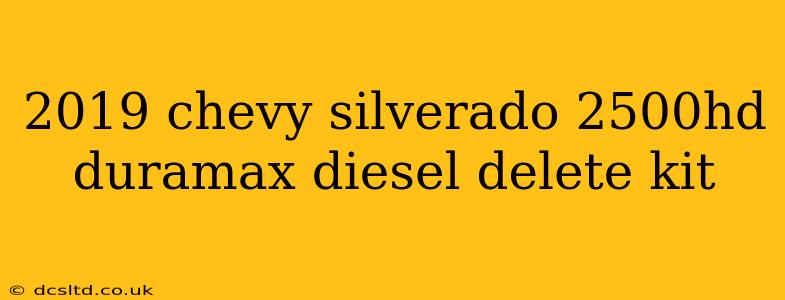The 2019 Chevy Silverado 2500HD Duramax diesel engine is a powerhouse, known for its impressive torque and towing capabilities. However, some owners seek to modify their trucks by installing a "delete kit," a controversial modification that removes or disables emissions control components. This guide explores the complexities of a 2019 Silverado 2500HD Duramax diesel delete kit, addressing common questions and concerns. It's crucial to understand that modifying your emissions system can have significant legal and practical consequences.
What is a Diesel Delete Kit?
A diesel delete kit typically involves removing or bypassing components of the vehicle's Exhaust Gas Recirculation (EGR) system, Diesel Particulate Filter (DPF), and Selective Catalytic Reduction (SCR) system. These systems are designed to reduce harmful emissions. A delete kit often includes tuning software that adjusts the engine's parameters to compensate for the removed components. The purported benefits include increased horsepower and torque, potentially improved fuel economy (although this is debated), and reduced engine regeneration cycles (the process the DPF goes through to burn off soot).
Why Would Someone Install a Diesel Delete Kit?
Several reasons motivate owners to consider a delete kit:
- Increased Performance: Removing emissions components can lead to a noticeable increase in horsepower and torque, enhancing the truck's towing and hauling capabilities.
- Reduced Regeneration Cycles: DPF regeneration can be time-consuming and potentially problematic. A delete kit eliminates this process, allowing for uninterrupted operation.
- Potential Cost Savings (Debated): While some claim improved fuel economy, this is highly dependent on driving habits and other factors. The long-term cost implications of potential repairs or legal issues should be carefully considered.
Is a Diesel Delete Kit Legal?
No, installing a diesel delete kit is generally illegal in most jurisdictions in the United States and other countries. Modifying emissions systems violates federal and state clean air laws. This can result in hefty fines, vehicle impounding, and even criminal charges. The legality varies depending on location and the specific modifications made, so always check your local regulations before considering any modifications.
What are the Risks of Installing a Diesel Delete Kit?
Besides the legal ramifications, installing a diesel delete kit carries significant risks:
- Voiding the Warranty: Modifying emissions systems will almost certainly void your vehicle's warranty, leaving you responsible for costly repairs if something goes wrong.
- Engine Damage: Removing critical emissions components can cause premature engine wear and potentially catastrophic damage.
- Environmental Impact: Disregarding emissions controls contributes to air pollution and negatively impacts the environment.
What are the Alternatives to a Diesel Delete Kit?
If you're seeking improved performance, consider these alternatives:
- Performance Tuning: Professional tuning can optimize engine parameters within legal limits, improving performance without compromising emissions compliance.
- Exhaust Upgrades: Upgrading the exhaust system can enhance performance and sound, without affecting emissions controls.
Does a Diesel Delete Kit improve Fuel Economy?
While some claim improved fuel economy with a delete kit, it's not a guaranteed outcome. The removal of emissions components can lead to changes in engine operation that might offset any potential gains. In many cases, it's unlikely to significantly improve fuel economy, and could even worsen it depending on driving conditions.
How Much Does a Diesel Delete Kit Cost?
The cost varies greatly depending on the specific components included and the installer's labor rates. Expect to pay several hundred to over a thousand dollars for a kit and installation. However, remember to factor in the potential costs of fines, repairs, and legal fees if caught violating emissions regulations.
Conclusion
A 2019 Chevy Silverado 2500HD Duramax diesel delete kit offers potential performance gains, but it comes with significant legal and practical risks. Before considering such modifications, carefully weigh the potential benefits against the severe consequences of violating emissions regulations and potentially damaging your engine. Exploring legal alternatives like professional tuning or exhaust upgrades can achieve similar performance improvements without the legal and mechanical risks. Remember to always prioritize responsible vehicle modifications and comply with all local, state, and federal laws.
